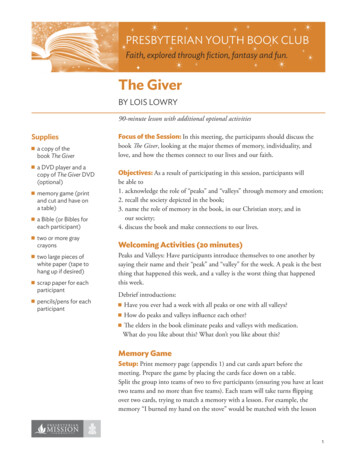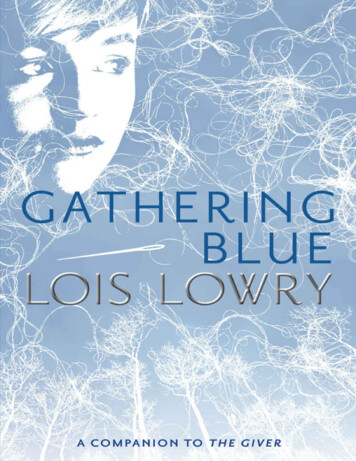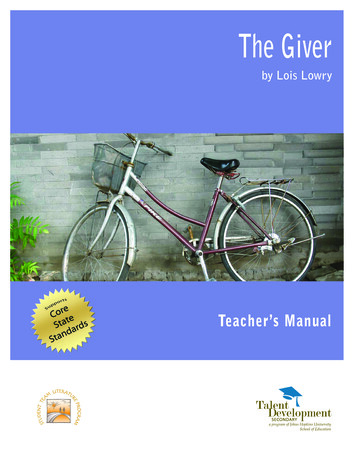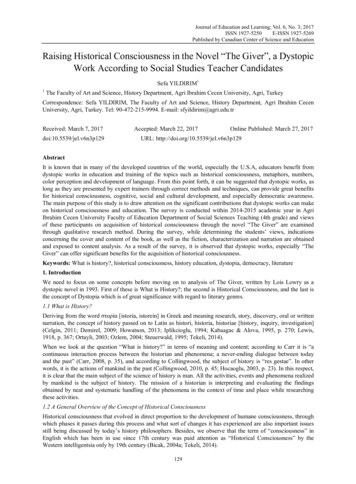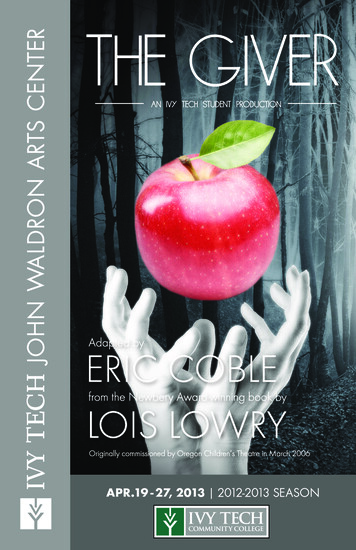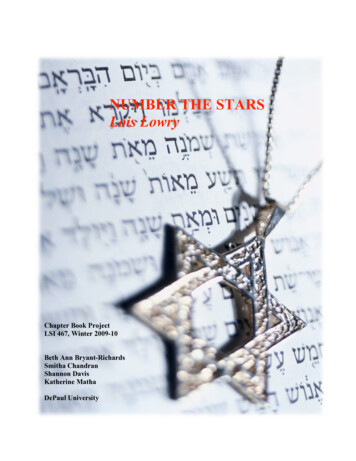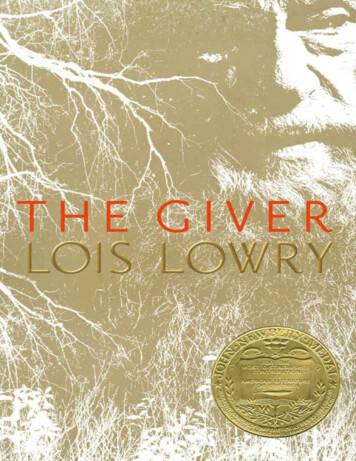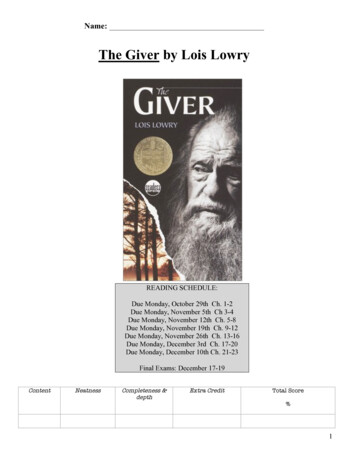
Transcription
Name:The Giver by Lois LowryREADING SCHEDULE:Due Monday, October 29th Ch. 1-2Due Monday, November 5th Ch 3-4Due Monday, November 12th Ch. 5-8Due Monday, November 19th Ch. 9-12Due Monday, November 26th Ch. 13-16Due Monday, December 3rd Ch. 17-20Due Monday, December 10th Ch. 21-23Final Exams: December 17-19ContentNeatnessCompleteness &depthExtra CreditTotal Score%1
The Giver Pre-Reading QuizDirections: Answer TRUE or FALSE to these statements:1.An ideal community would not have any hunger or starvation.2.An ideal community would not have any jealousy or competition.3.An ideal community would not have any unemployment.4.All children should have equal possessions and privileges at a certain age, regardless ofthe status of their families.5.Families are much closer when they share their feelings.6.Life would be better and easier if we did not carry bad memories in our heads.7.Overpopulation is such a problem that families should not be allowed to have more thantwo children.8.There is no real need to learn about world history.9.There is no real need to learn about one’s own family’s history.10. One’s job or occupation in life should be a careful match of one’s interests, talents, andskills.Be prepared to explain your answers to the class!2
Author Biography- Lois LowryLois Lowry was born in Hawaii on March 20,1937. She was born the middle child in a familyof three children, a blessing which Lowry believesallowed her the freedom to read and revel in herimagination.Lowry’s father was a career American militaryofficer, and the family moved frequentlythroughout the author’s childhood. Lowry alsolived in New York and Pennsylvania in her youth.In 1948, at eleven years old, Lowry’s familymoved to an Americanized military communityin Tokyo, Japan. Even though the family lived inin this thriving Asian city, they lived in an American-stylehouse with American neighbors, saw American movies,and attended an American school. In other words, shelived seperately from the Japanese, and therefore wasvery curious about her Japanese neighbors.In The Giver, Lowry draws upon her memories of secretly exploring theJapanese neighborhoods of Tokyo on her bicycle. This experience partially forms the basisof Elsewhere in the novel.Lowry returned to New York City for high school and attended Brown University in RhodeIsland for college. In 1956, at age nineteen, Lowry left Brown to marry naval officer DonaldLowry. The Lowry family moved frequently and had four children, two daughters and twosons.The family settled in Maine, and Lowry completed her degree in English Literature at theUniversity of Southern Maine in 1972. The author began working as a freelance journalistand published her first realistic fiction novel, A Summer to Die, in 1977, the same year thatshe and her husband divorced.Lowry continued to write and began publishing the Anastasia Krupnik series in 1979. In1989, Lowry won her first Newbery Medal for the historical fiction novel Number the Starswhich tackles the Nazi occupation of Denmark during World War II. In 1993, the authorwon her second Newbery medal for her fantasy novel The Giver which discusses a futuristic,utopian society that goes terribly wrong. Even though Lowry’s novels vary greatly in timeperiod and genre, they all contain the same basic themeof the importance of nurturing human connections.Lowry currently divides her time between Cambridge,Massachusetts and an old farmhouse in Maine. Sheenjoys reading, gardening, knitting, and spending timewith her grandchildren.genre: a type or categoryof artistic work, separatedby similar subject, style,theme, etc.3
What do you remember about the author?Directions: Using the biographical information about Lois Lowry, answer thefollowing questions. Write the letter of the correct answer on the lines provided.1. What is the author’s purpose in writing this biography of Lois Lowry?a. to tell the reader an entertaining story about Lois Lowryb. to persuade the reader to read one of Lois Lowry’s booksc. to provide information about Lois Lowryd. to describe Lois Lowry’s childhood2. Based on the information in the first two paragraphs, the reader can conclude that:a. Lois Lowry did not enjoy moving during her childhood.b. Lois Lowry had a close relationship with her family.c. Lois Lowry enjoyed living in New York.d. none of the above3. Lowry’s time living in Japan is important because:a. she learned to speak Japaneseb. it influenced her writing of The Giverc. she enjoyed exploring Tokyod. she made many friends in Japan4. Where would be the BEST place in the biography to insert information about other bookswritten by the author?a. in paragraph sixb. add an additional paragraph between paragraphs six and sevenc. in paragraph fived. in paragraph fourDirections: Answer the following questions using complete sentences.5. List the two books for which Lowry was awarded the Newbery Medal. Also, include theyear in which she won each award.6. The term genre is used in this biography. Explain in your own words what a literarygenre is. List as many genres as you know.4
Dictionary for this novelChapter One· landing field- runway where airplanes land· needle-nosed single-pilot jet- small, fast airplane with one pilot and no passengers· hymn- song of praise· hatchery- place for hatching fish eggs· salmon- a type of fish which is frequently eaten as food· tunic- a long shirt· port- a specific place where a vehicle is parked· rituals- social customs which are done repeatedly· learning usages- ways of doing things· Nurturer- a person assigned to care for infants· newchild- infant· gender- male or female sex· spouses- husbands or wives· Department of Justice- court and legal systemsChapter Two· Elders- an official position of rank and authority· appeal process- legal proceedings in which a person requests that a decision or ruling be changed· comfort object- an item, typically a stuffed animal, that a child uses to console himselfChapter Three· Birthmother- biological mother· singsong voice- speaking in a rhythmic, lilting tone· sphere- three-dimensional circle, like a ball· dwelling- house· magnifying glass- handheld object used to make items appear largerChapter Four· bikeports- parking places for bicycles; a bike rack· groupmates- class of children who are the same age· community structures- public buildings· House of the Old- home for elderly people, similar to a nursing home· attendant- a person who greets visitors; a secretary· Caretaker- a person assigned to work with the elderly· family unit- group of people consisting of a mother, father, and one or two children who live togetherChapter Five· Security Guards- police officers· Stirrings- feelings of sexual desireChapter Six· Assignment- job which a person is given· Auditorium- public building for large gatherings of people· Naming and Placement- ceremony in which a child is given a name and placed in a family· Inadequate- a child who does not meet the developmental standards for his/her age· Uncertain- a child whose developmental status is not yet determined· Ceremony of Loss- funeral service for a person who dies accidentally or prematurely· Murmur-of-Replacement Ceremony- service in which a name is reintroduced to the community5
· podium- stand on which a speaker places his/her notes· midday meal- lunch· Sanitation Laborer- person who picks up trash· Matching of Spouses- process of selecting males and females to create a family unit· Committee of Elders- group of authority figures who make decisions about the communityChapter Seven· tattletale- informing an authority figure when someone does something wrong· precision of language- using specific vocabulary words to fit a situationChapter Eight· crescendo- increase in volume of music· integrity- adhering to moral values· courage- mental strength to overcome danger and fear· wisdom- knowledgeChapter Nine· carrying containers- box or basket for storage on the back of a bicycle· Nurturing Center- facility where infants are cared for until they are placed in a family unit· Not-to-Be-Spoken- name which is not to be used or person who is not to be referred to· sleepingroom- bedroom· Twelve- a twelve-year-old child; the age when a person is assigned a job· Four- a four-year-old childChapter Ten· citizen-in-training- a twelve-year-old child who is learning to do the job which he/she was assignedChapter Eleven· Annex- a separate room attached to a larger building· Sameness- all persons and items appearing and acting alike, as well as experiencing the same things· Climate Control- managing the weather so that it is always the same· transmission- the process of one person giving a memory to another personChapter Twelve· discipline wand- small stick-like instrument used to strike a person who misbehaves· occupational therapy- exercises which promote recovery or rehabilitation· seeing beyond- the ability to perceive qualities, such as colors, which are not viewed by others· one-generation memories- recollections of personal experiences“work the kinks out”- fix the problemsChapter Thirteen· small-muscle control- using the hand muscles to manipulate objects· geraniums- red flowers with a long stem and round buds· Hall of Open Records- public building where legal documents are stored· Landscape Workers- people who plant and care for natural surroundings such as lawns and flowersChapter Fourteen· relief-of-pain- medicine which alleviates bodily discomforts· anesthetic ointment- numbing medicine which is rubbed on the skin· spasms- involuntary muscle contractions· turquoise- bluish-green colorChapter Fifteen· whinnying- horse’s neigh6
Chapter Sixteen· “get his bearings”- figure out where one is located· wholeheartedly- completelyChapter Seventeen· ambush- attacking a person or group by surprise· counter-attack- to fight against a person or groupChapter Nineteen· syringe- a device used to inject fluids; a shot· plunger- a device which forces liquid out of a syringeChapter Twenty-One· frazzled- nervously upset; anxious· fugitives- persons who are trying to escape from the policeChapter Twenty-Two· perils- dangers· banquets- meals with large displays of items to eat7
Essential Questions:(and possible test questions!)What makes life truly worth living?Is a "perfect" society possible?Is it something we really want?Is it worth giving up freedom, individuality, and choice for safety, security, andcomfort?How can an individual shape his or her community?In order to truly live a life worth living, do we have to experience pain andsuffering?What is the importance of memories to an individual and to a society?How important is individuality and diversity in a society?Could something intended for the greater good really be bad?8
Community “Life Schedule”BIRTHLive with other new children in the Nurturing CenterComfort object given12*345*6*789Receive bicycle101112Full AdulthoodApply for spouse/Matching of spouseChildless AdultGo to live with Childless AdultsOld AgeCEREMONY OF RELEASE9
The Giver Key TermsChapters 1 & 2At first, this sounds like a perfectly normal world just a little odd, but peaceful and quiet. But the people use someunusual terms to tip you off that this is not really our world. What do these words really stand for?NurturerNurturing CenterNaming, ElderReceiverAssignmentComfort ObjectChapters 3 & 4NewchildBike PortSpeakerRehabilitation CenterHouse of the OldVolunteer HoursBirthmotherCelebration of Release10
The GiverVocabulary Chapters 1-4Place each vocabulary word on the line below the picture.(p.4) rituals (n.): established procedures for a ceremony, especially religioussyn: ceremonies; ritesant: single spontaneous occurrence(p.15) recreation (n.):activity that is relaxing or funsyn: amusement; entertainment ant: work(p.20) chastisement (n.): harsh criticismsyn: punish; rebukeant: praise; reward(p. 27) dwelling (n.): a shelter used for long time livingsyn: house; homeant: outside; unfamiliar placeCHAPTER 11. Describe Jonas’ community.2. Describe Jonas’ family. What do his parents do?3. Who is Asher?11
4. What is the word that Jonas feels? Why?5. What is “release”?6. What do they discuss in their ritual of feeling sharing?7. What is this “Ceremony of 12”?CHAPTER 21. What happens every December?2. What happens when children become Ones? Nines?3. Who is the Receiver and how are rules changed? (p. 14)4. Who is Gabriel and why is Jonas’ father worried about him (ch. 1)?5. Why is the Ceremony of 12 so important?6. What things do Jonas’ parents share with him about their memories of their assignments and oftheir friends’ assignments?12
CHAPTER 31. What did Jonas notice about the apple?2. How do all evenings end in the community?3. What else do you learn about the community fromthis chapter?4. What about birthmothers?CHAPTER 41. What happens to Eights?2. Where does Jonas spend his volunteer hours? What does he do? What do you learn?3. What happens at release?13
The GiverVocabulary Chapters 5-8(p. 34) infraction (n.): an act of breaking a rule or lawsyn: offenseant: obey(p. 46) relinquish (v.): to let go of or give upsyn: surrender; releaseant: keep(p. 54) acquisition (n.): something you have gottensyn: possessionant: surrendered(p. 62) transgressions (n.): breaking a rule; committing a crimesyn: trespass; sinant: comply; go along withCHAPTER 51. What was Jonas’ dream?2. What are stirrings?3. What does Jonas have to do now that he has had stirrings?4. Why do you think he has to do that?14
5. After reading through Chapter 5 complete a Venn Diagram (see the example below) illustratinglikeness and differences in your and Jonas's communities.CHAPTER 61. What happened to Sevens?2. What wasn’t Gabriel at the Naming?3. What was the Ceremony of Loss?4. What else do you learn about release?5. What happened for Tens and Elevens?15
6. How do people get spouses and children?CHAPTER 71. What is Jonas’ number? How are theyassigned numbers?2. What is Asher’s assignment?3. Page 56, “Thank you for your childhood.” Explain.4. Why do you think Jonas was skipped?CHAPTER 81. What is the difference between “assigned” and “selected”?2. What is Jonas selected to do?3. What attributes does Jonas have that will help him in his assignment?4. What is this “capacity to see beyond”?16
The GiverVocabulary Chapters 9-12(p. 69, 70) excruciating (adj.): extremely painful or distressingsyn: agonizingant: pleasant(p. 74) conspicuous (adj.): noticeable; easily seensyn: obviousant: hidden; unobtrusive(p. 84) obsolete (adj): Of no consequence or importance; forgottensyn: uselessant: useful(p. 88) fretful (adj.): irritable; inclined to worry anxiouslysyn: fussy; anxiousant: happy; contentChapters 9-12: Answer each question using a complete sentence.CHAPTER 91. In this chapter, Jonas receives his rules. What does he think ofeach rule?CHAPTER 101. How is Jonas treated by the secretary?2. What is different at the Receiver’s home? (whole chapter)3. What is the Giver’s job? What must he give Jonas?17
4. Page 78, what does this mean: “I am so weighted with them.”?CHAPTER 111. What is Jonas’ first memory?2. What is Jonas’ reaction to the first memory?What about the Giver?3. What happened to snow?4. What is Jonas’ second memory?5. What is Jonas’ third memory?6. What is Jonas’ title?CHAPTER 121. What is Jonas beginning to see?2. How does the Giver help him?3. What happens to color in this community (vs. in memory)?4. What is Jonas’ opinion of sameness?18
The GiverVocabulary Chapters 13-16(p. 97) hueless (adj.): without colorsyn: white; bareant: colorful(p. 108) invigorating (adj.): Powerfully excitingsyn: funant: boring(p. 113) ominous (adj.): indicating (or threatening) future unpleasantness; sinister; forebodingsyn: threatening; foreboding ant: welcoming(p. 122) solitude (n.): living or being by oneselfsyn: alone; isolatedant: with others; not aloneChapters 13-16: Answer each question using a complete sentenceCHAPTER 131. What causes frustration for Jonas?2. What is Jonas’ first startling and disturbing memory? What is his reaction?3. Is the Giver married? Explain about his marriage relationship.4. Why is a Receiver necessary in the community?19
5. What does Jonas wonder about when he’s not with the Giver?6. Why does the Giver sometimes send him away?CHAPTER 141. What is the first painful memory and what is itseffect on Jonas?2. What do he and the Giver have to hold painful memories?3. Why can’t everyone have memories, to share?4. What’s wrong with Gabriel?5. What happens when twins are born?6. How does Jonas comfort Gabriel? What does he think of this?CHAPTER 151. What is this memory and what is its result on Jonas?CHAPTER 161. What are some good memories?2. What is the Giver’s favorite memory? Explain.3. How does Jonas feel about this memory? What are some advantages and disadvantages of this?20
4. What happens when Jonas discusses this feeling with his parents?5. What is Jonas’ relationship to Gabriel now?6. How does Jonas break the rules at the end of this chapter? What implications will this have?The GiverVocabulary Chapters 17-20(p. 131) permeated (adj.): penetrated throughout; spread or seeped throughsyn: infiltrated; soaked ant: isolated(p. 139) dejected (adj.):having low spirits; dejectedsyn: discouraged; disheartened ant: thrilled; exuberant(p. 147) astonished (adj.): filled with great surprise or amazementsyn: dumbfounded; stunned ant: knowing; unimpressed(p. 160) vehicle (n.): a device used to transport people or thingssyn: car; transportation ant: feet (?)CHAPTER 171. How is Jonas changing?2. What is his reaction to his friends’ game of “war”?21
3. What are his feelings?4. What is Lily’s talent?CHAPTER 181. Explain what happened to Rosemary and its impact on the community.2. Page 145, what do they contemplate?CHAPTER 191. What is release?CHAPTER 201. What are Jonas’ feelings after obtaining this new knowledge?2. What are their insights about memory?3. Which of the senses did the Giver have? What was special to him that he hadn’t yet shared?4. What is their plan for creating change in the community? (whole chapter)22
The GiverVocabulary Chapters 21-23(p. 163) stealthily (adv.): done secretly or covertlysyn: sneakily; furtively ant: brashly; loudly(p. 171) subtle (adj.): difficult to detect or definesyn: elusive; imperceptible ant: harsh; obvious(p. 177) lethargy (n.):dullness of spirit; a lack of energy with drowsinesssyn: apathy; listlessness ant: hyper; energeticCHAPTER 211. Why did the plan change?2. What rules did he break?3. What was their travel ritual?23
4. How did he know they were looking for him? How did he hide?5. What happened to his memories?CHAPTER 221. How was the landscape changing?2. What are new dangers?CHAPTER 231. What was the weather like?2. What happened to the bicycle?3. How does this book end? Discuss it.24
The GiverJournal topics & Quick writes150 words1.Short StoryWrite a short story about the future of the world. Your world of the future can be great orterrible. Your story can be serious, or humorous. Your story needs a title, characters, abeginning, m iddle, and end. It should be 200-250 w ords.2.RulesFree write on the topic: Rules. Just go ahead and write!However.if you need some help coming up with what to write.here are some questions youcan answer: Do rules make life easier, or harder? What are the important rules that affect yourlife the most? Are rules & laws necessary or unnecessary? Why do we have rules, if it is ourhuman right to be free? Think about The Giver, too. Are their rules good or not?3.M em ory Department StoryFirst, imagine there is a Memory Department Store--a place where you can buy (and sell? andtrade? and repair?) memories. For your journal, design an advertisement for this memory store.Use a piece of unlined paper. The advertisement should have words and pictures-you can designthis on a computer or you can draw it. I am looking for creativity and imagination.4. M emoriesDescribe 4 memories you have. Pick 2 m emories you think of as happy, and 2 memories youthink of as sad. Describe each memory, describe why it is happy or sad, and then try toimagine what your life would be like without that memory. (That is a hard thing to do,but try.) The description of each memory should be at least 50 w ords5. Sam enessWrite about Sameness as it really does exist at ESIS. Write about the dress and behaviors ofdifferent groups you know of. Think of popular clothing, haircuts, ways of talking, etc. Itsometimes seems like people go through ceremonies and have to get the same styles. Are peopleafraid to be different?6. New IdeasDescribe something (or things) new you learned or thought about while reading The Giver orworking during this unit.7. Utopia vs. dystopia“Utopia” is a perfect world or society while a “Dystopia” is a world that is supposed to beperfect but turns horribly wrong. Describe or draw your perfect utopia. Describe or draw yourmost horrible dystopia.25
The GiverCreative Projects(Choose one project. Due upon finishing the book)Extra projects can be done for extra creditDirections: Read over the descriptions of the projects below and select one. Notice thatdifferent projects involve different amounts of people. You can have no more or less than eachproject requires.1) TALK SHOW (2 – 3 people) (Be ready to be filmed!) Guests should be characters from The Giver. NO Jerry Springer type shows. It should be more like Maury or Oprah, where actualquestions are asked or answered. Be creative in how you present your talk show. (Wear a costume, get into character,change your voice, change characters, etc.) Specific issues should be discussed that were important to our study of The Giver. The talk show must be at least 5 minutes and no longer than 15 minutes. You must come to some sort of resolution at the end of the talk show. Some point ofunderstanding should be made.2) BOARD GAME (1 person) Design a board game to be played based on The Giver and Jonas’ journey throughthe novel. The object of the game is to get Jonas and Gabe safely out of the Community toElsewhere. Be sure to include directions for the game and all playing pieces necessary to play.3) THE COMMUNITY CHRONICLE (1 person) Write an article for The Community Chronicle. An illustration (photo, graphic ordrawing) should accompany your story. The newspaper should contain the characters, setting, and plot of the novel. Write as a reporter would – including the who, what, why, when, where, and how.Include some “man on the street” interviews and get the public’s reaction to theevent. It should be at least two pages, typed, double-spaced.5) TRAVEL BROCHURE (1 person) Create a travel brochure for “Elsewhere” with the goal being to convince othersfrom Jonas’ community to leave for your Elsewhere. Your brochure must demonstrate a strong knowledge of Jonas’ community and acomparison to another real or imagined community.26
You must include descriptions of each of the following and address why Elsewhere isbetter than The Community.A. EconomyB. FamilyC. TransportationD. Law and OrderE. EnvironmentF. EducationG. Recreation Your brochure must be neat, colorful, and creative.6) COMIC BOOK (1 person) Must focus on at least two significant scenes from The Giver. The comic should look like a comic book (with cover and panels). Also, please colorthe pictures. You must introduce the comic and explain why you have chosen to illustrate the givensection of text.Final project“Giving Back”Let’s return back to our essential question:“How can an individual shape his or her community?”Jonas, the protagonist in The Giver, lives in what seems to be a perfect world. Everything isunder control. There is no war or fear or pain or emotion. There is no past. There are nochoices. Everyone is assigned a role in the Community.Upon turning 12, Jonas is chosen to receive special training from The Giver. Only The Giverholds the memories of the true history, pains, and pleasures of life. Now Jonas knows thetruth about the Community and has decided to take action.Now it’s your turn to take action as well! This is your chance to be an agent for changejust as Jonas was in The Giver. How could you “give back” to your community?27
The Giver by Lois Lowry READING SCHEDULE: Due Monday, October 29th Ch. 1-2 Due Monday, November 5th Ch 3-4 Due Monday, November 12th Ch. 5-8 Due Monday, November 19th Ch. 9-12 Due Monday, November 26th Ch. 13-16 Due Monday, December 3rd Ch. 17-20 Due Monday, December 10th Ch. 21-23 Final Exams: December 17-19



